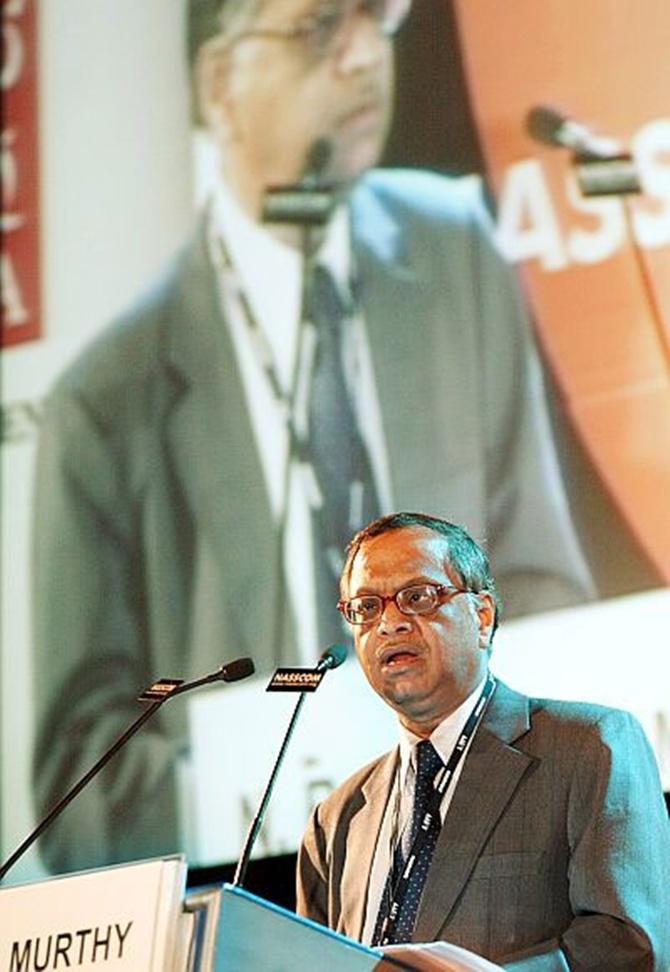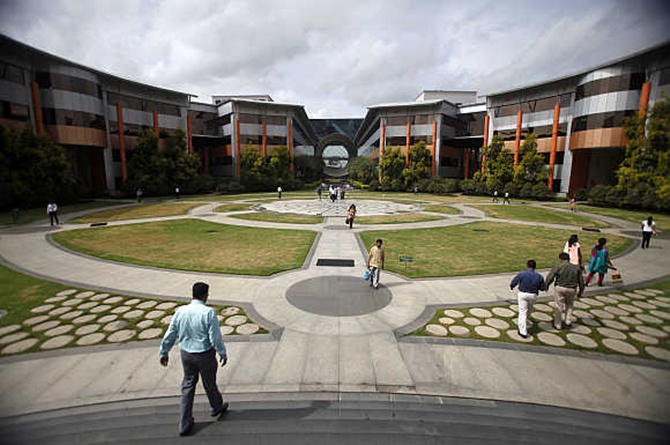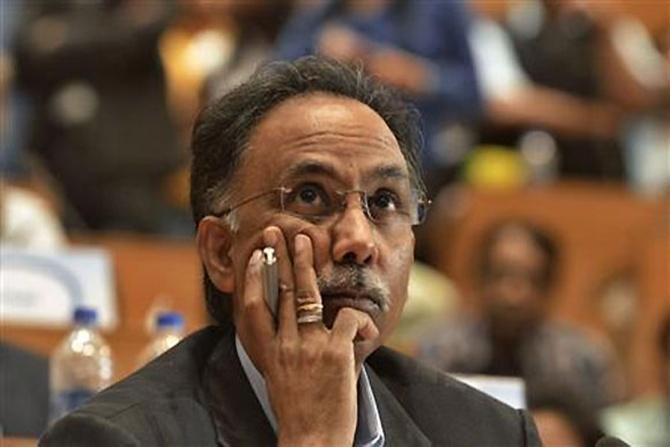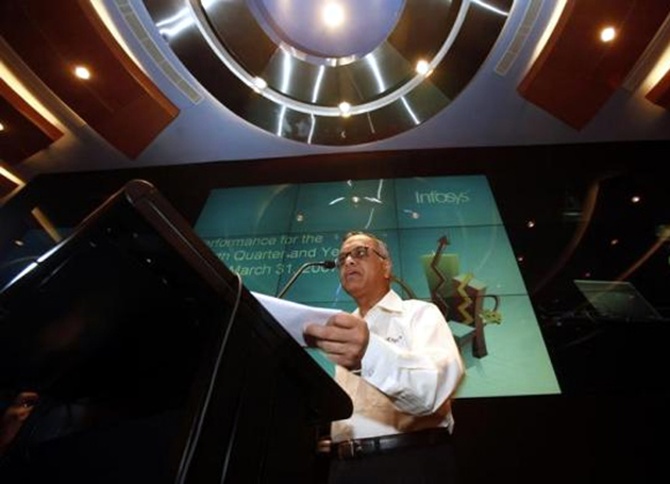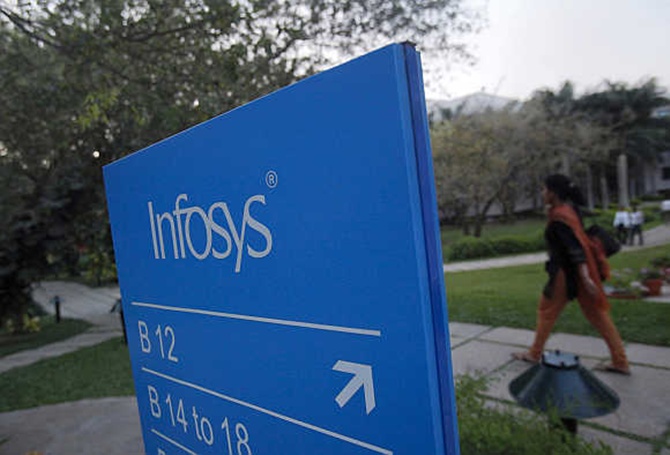 | « Back to article | Print this article |
Will Narayana Murthy succeed in his second innings?
NR Narayana Murthy came out of retirement in June to run a floundering Infosys. Indulekha Aravind takes stock of his first quarter in office.
Late in the afternoon of August 9, NR Narayana Murthy entered the main conference room in Corporate Block, at Infosys’s headquarters at Electronic City, Bangalore, to address investors at a meeting organised by Barclays.
It had been a little over two months since NRN had returned to take charge of Infosys as executive chairman after he retired in 2006. Over 50 fund managers had gathered to hear what he had to say.
Dressed in a suit and accompanied by at least ten top executives, including Executive Vice-chairman ‘Kris’ Gopalakrishnan who sat to his right (CEO SD Shibulal was in the US), NRN started proceedings promptly at 3 pm.
Over the next 90 minutes, he candidly discussed the mistakes the company had made and outlined his strategy to get Infosys back on track. “The ambience was very positive; he knew exactly what the issues were and answered all questions,” says a fund manager who was present at the session. Another analyst who attended the meeting says that he has given himself 36 months for the task.
That’s two years before his new term comes to an end in 2018. But the 67-year-old also said that day: “I’m an old man in a hurry.”
Click NEXT to read more…
Will Narayana Murthy succeed in his second innings?
The three months since June 1, when he once again took over the company he co-founded in 1981, bear out the truth of this.
According to sources close to him, on the days that he is in Bangalore, NRN has been coming to office at 6.40 in the morning and staying on till 9 pm, burying himself in files and data sheets to analyse what has gone wrong.
He continues to use the office he occupied when he last held an executive role.
In his second innings, NRN has brought son Rohan Murty along as executive assistant to help him resolve the myriad issues the company has been grappling with, and which are believed to be the reasons Infosys was losing out to its peers in a highly competitive market.
The company, which had once prided itself on the predictability of its performance, stopped giving quarterly earnings guidance from June 2012 after missing its targets five times in the preceding six quarters.
And in May, a report by research firm Gartner confirmed that younger rival Cognizant had overtaken Infosys to emerge as the second largest Indian IT services company by revenue.
Click NEXT to read more…
Will Narayana Murthy succeed in his second innings?
NRN doesn’t need a spreadsheet to tell him that that one of Infosys’s biggest challenge is its demoralised workforce.
In the June quarter this year, Infosys had seen attrition climb to 16.9 per cent from 14.9 per cent in the year-ago quarter. Peer TCS’s attrition for the same period was 10.5 per cent, an all-time low, while Wipro’s attrition was 13.2 per cent, down from 15.6 per cent a year ago.
To restore employee morale, NRN contacted the over 150,000 employees on email the very first day. “We have much to do. The need of the day is to…..” Damage control had begun. Less than two weeks later, he convened a “town hall” where he reportedly told them, “Infosys is fighting two battles: one with the competition, and the other with our employees. We can fight only one battle at a time and it shouldn’t be with our employees.”
The convention centre, which can hold over 4,000 people, had filled up long before the session was to start. Many were left outside shouting to be let in - not unlike a rock concert - and were finally accommodated in various other auditoriums on the campus where the proceedings were broadcast live.
Click NEXT to read more…
Will Narayana Murthy succeed in his second innings?
During the town hall, he was forthright in responding to all the issues raised, according to Infosys employees who were present.
One was the “dress code” he had introduced years ago, which required employees to wear a tie to work three days a week or cough up a fine of Rs 200 per violation.
This might sound trivial (and puzzling!) to outsiders but for employees who were already fed up with the company, it was one more sticking point.
“He explained that he had once been at a client meeting in the US, where it was pointed out that his (onsite) people were dressed shabbily compared to others. He realised then that employees should dress professionally, and wanted to inculcate that,” says a mid-rung Infosys employee, who feels NRN’s message was well-received.
Click NEXT to read more…
Will Narayana Murthy succeed in his second innings?
After Bangalore, NRN travelled to the Infosys campuses in Hyderabad and Chandigarh, where he addressed employees in similar town halls.
He also held an “open house” in one of the food courts at the Bangalore headquarters, during which anybody was welcome to walk up to him and ask questions.
The open house was broadcast on big screens in the other food courts.
More than pep talk, NRN knows what holds people back. So, without wasting time, he announced an across-the-board salary increase and a wage restructuring.
“There is definitely a more positive sentiment at work. I myself feel more secure, as if I am being looked after better,” says the Infosys employee in Bangalore who attended the town hall.
Those who know NRN say he is a forceful speaker, a good motivator and, above all, an excellent salesman. That’s perhaps why he has been spending considerable time in the US, where 60 per cent of the company’s revenues come from, meeting the top clients and putting to good use his skills in sales and marketing.
“He would be able to reassure the clients and also increase the wallet-share of each, as well as sell Infosys’s potential as a strategic partner,” says a former executive who has worked closely with NRN. He has also met some major clients at the company campus, according to a top executive. NRN, who declined to be interviewed for this report, is currently in the US.
Click NEXT to read more…
Will Narayana Murthy succeed in his second innings?
His reappearance has caused some churn in the highest echelons. There have been three high-profile exits since he took charge, the latest being Wednesday’s resignation of Ashok Vemuri, global head of manufacturing and the Americas, board member, and one of the contenders for the CEO post once Shibulal retires in 2015.
Basab Pradhan, the head of global sales, quit a month after NRN joined, while Sudhir Chaturvedi, financial services head for the Americas, also resigned earlier this month.
The executive quoted above says NRN has already identified new teams to carry out his strategy for cost-optimisation and improving the effectiveness of sales, and is currently putting them in place.
“At present, his biggest focus is getting the sales team back on track and he is trying to the make them more accountable,” says another source close to the development. This has meant eliminating several layers of leadership among the sales teams. “Infosys has sales teams for each vertical which report to their respective vertical heads. It also has a horizontal layer that cuts across verticals,” he says.
The team created under Pradhan is also reported to have been dismantled, though the company refuses to comment on the matter.
Click NEXT to read more…
Will Narayana Murthy succeed in his second innings?
The next layer that may also be eliminated is the strategic global sourcing team, whose functions again clash with the sales team and the majority of whose members are onsite.
“He wants to reduce unnecessary costs onsite and is also trying to send a strong message that if senior resources are not contributing, they need to reexamine their decision to work at the company,” says the executive.
To help him in his strategising and revamping, NRN has created a Chairman’s Office, which has Rohan Murty as one of its members.
The rest of his A-Team, put together subsequently, includes Ranganath D Mavinakere, Binod Rangadore and Nithyanandan Radhakrishnan, who were also appointed as members of the executive council this month. Mavinakere, the company’s chief risk officer till July, is now heading a cost optimisation initiative - another of NRN’s priority areas.
Rangadore will be at the helm of a new global delivery model initiative, while Radhakrishnan will serve as general counsel and senior vice-president. All this has fuelled talk that decision-making at Infosys has got highly centralised.
When Infosys announced that NRN was returning to the company as executive chairman at the invitation of the board, many were critical of the move. What attracted their ire was the fact that NRN, who had consistently emphasised the importance of sticking to a retirement age and of not allowing the family members of the founders join the company, had gone back on his word.
But investors do not seem to be perturbed by this lapse in corporate governance - the Infosys stock has risen over 20 per cent since he took over on June 1. Broking firm CLSA has even said investors’ money could nearly double in the next three years if NRN resolves key challenges facing the company.
Click NEXT to read more…
Will Narayana Murthy succeed in his second innings?
Though it is unrealistic to credit the stock price spike to NRN’s return alone, Infosys shareholders were generous with their praise at the extraordinary general meeting convened on August 3 to approve NRN’s appointment as whole-time director of the company.
About 350 shareholders had turned up at Christ College in Koramangala, Bangalore, for the 15-minute meeting. The mood was upbeat, almost festive.
“He (NRN) has returned to restore the prestige of the company and for the security of its shareholders,” said Radhakrishna Rao, 74, a retired engineer. Vinayak Shiralkar, an advocate who had travelled from Hubli, added: “When a person is capable and has experience, age should not matter.” Clearly, NRN knows how to charm.
Infosys could use his communication skills, since this was considered to be one of current CEO Shibulal’s weak spots. “He said that going forward, bad news will take the elevator and good news, the stairs,” says one of the executives who attended the Barclays investor meet.
Click NEXT to read more…
Will Narayana Murthy succeed in his second innings?
Neither Shibulal nor Gopalakrishnan were good at public interface, says the former Infosys executive quoted earlier, and “therefore they were criticised, which was not entirely fair to them”.
Nevertheless, NRN still has to deal with multiple challenges before the company can return to its glory days. Says Sudin Apte, founder and CEO of advisory firm Offshore Insights: “Infosys has become difficult for clients to work with. It’s not about higher billing rates — its response times are long and it is not as flexible as others with vendor and contracting terms.”
At the same time, Apte points out that since most of the company’s rigid policies were framed under NRN and his successors had continued to execute them, he is best placed to execute the changes required in a different market.
All this is in addition to the errors NRN himself has spoken about, such as shifting focus from large outsourcing contracts, increase in operational costs and sagging employee morale.
With reports of his son’s elevation to the post of vice-president evoking sharp criticism from some quarters, NRN now has more at stake than ever before.
As former Infosys CFO Mohandas Pai wrote in Business Standard soon after NRN took over (Pai declined to comment for this report): “If NRN can turn it (Infosys) around, make the new leadership perform and then go into the sunset within three years along with his son Rohan, his legacy would keep us proud for many years to come.”
The question is, can he?
